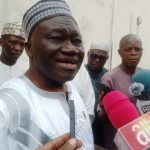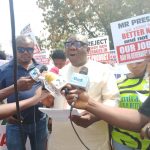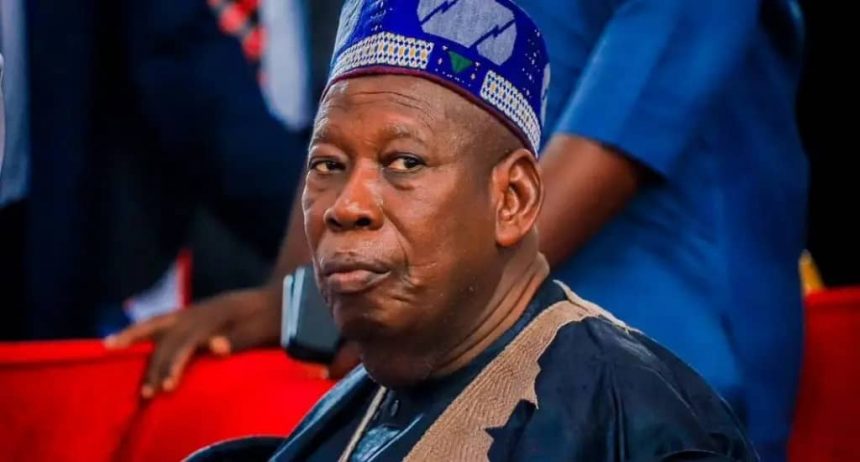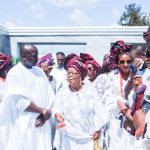Cracks Deepen in Kano APC as Gubernatorial Ticket Sparks Political Crisis.
By Bala Salihu Dawakin Kudu Democracy Newsline Newspaper 12th October 2025.
As the 2027 general elections draw closer, the political atmosphere within the All Progressives Congress (APC) in Kano State is becoming increasingly tense and uncertain. What should be a period of reconciliation, party restructuring, and grassroots mobilization has turned into a bitter power struggle among top party figures, threatening the unity and future of the party in one of Nigeria’s most politically strategic states.
The internal wrangling—sparked by the early jostling for the APC’s 2027 gubernatorial ticket—has exposed the deep divisions within the party. While the general understanding across the party is that it is too early to start campaigning for the governorship, some political heavyweights appear to be moving full speed ahead, creating friction and suspicion among party stakeholders.
At the heart of the crisis are influential personalities such as:
Senator Barau I. Jibrin (Deputy Senate President), Dr. Nasiru Yusuf Gawuna (2023 gubernatorial candidate), Hon. Murtala Sule Garo (former commissioner and political strategist),
A. A. Zaura (businessman-politician), Hon. Abubakar Abba Bichi, and Senator Abdurrahman Kawu Sumaila.
Each is believed to be nurturing gubernatorial ambitions, but the lack of a clear party direction, zoning formula, or internal consensus has created a chaotic environment where ego, ambition, and factionalism are taking precedence over party unity.
Rather than build a common front after the party’s defeat in the 2023 governorship election, the APC in Kano appears to be tearing itself apart, with each camp pulling in different directions and attempting to assert dominance.
The recent APC stakeholders’ meeting held in Abuja, which was intended to foster reconciliation and chart a unified path forward, ended up exposing more fault lines within the party. While officially described as a meeting for “political alignment” and party strengthening, many attendees left feeling disillusioned.
Observers described the event more as a “get-together jamboree” or political show of strength, rather than a serious deliberation on the party’s survival. Rather than promote unity, the meeting ended up amplifying tensions, as it failed to address the fundamental issues causing unrest within the Kano APC.
There was no honest conversation about the dangers of premature governorship campaigns, the lack of grassroots mobilization, or the leadership structure of the state chapter. Instead, unresolved grievances were swept under the carpet—further alienating many stakeholders.
Dr. Abdullahi Umar Ganduje, the APC former National Chairman and widely recognized leader of the party in Kano, remains a central figure in this unfolding drama. His leadership is undisputed within the APC in the state—but many believe that his actions and inactions are fueling the crisis rather than resolving it.
Instead of focusing on uniting the party, Dr. Ganduje is being accused of promoting division by allegedly supporting the return of Abdullahi Abbas as the State Party Chairman—an unpopular move among many factions. Some believe the national chairman is more concerned with securing his loyalists’ political future than providing impartial leadership for party stability.
Ganduje’s silence on the ongoing premature 2027 campaigns and his failure to mediate among feuding party members are viewed as a dangerous abdication of responsibility.
It is no longer news that virtually all local government areas in Kano under APC are battling internal divisions. Many of the 2023 election losers, including former State House of Assembly and National Assembly members, have abandoned party activities and are even accused of working against the interests of the party in their respective constituencies.
As a result, APC’s grassroots structures are crumbling. Disenfranchised local leaders now believe they have no stake in the party, and whatever interventions or projects coming into their constituencies are cornered by a few, deepening mistrust and alienation.
In many areas, these divisions are so entrenched that no credible candidate can win an election under the current conditions, unless urgent reconciliation is carried out.
A major concern among party loyalists is the indifference of Kano politicians holding federal appointments under the Tinubu administration. Many of these appointees are invisible on the ground—disconnected from party affairs and failing to use their influence to strengthen the APC structure in Kano.
Their absence has created a vacuum in leadership and support, particularly at the ward and local government levels. For a state where politics is highly grassroots-based, this detachment from party-building is a dangerous sign, especially as the NNPP and other opposition parties continue to mobilize aggressively.
The triangle of tension between Gawuna, Garo, and Barau Jibrin is arguably the most explosive. Gawuna, who lost narrowly in 2023 and is seen by many as the rightful heir to the ticket, is believed to still enjoy Ganduje’s backing. Garo, with his vast youth support base and aggressive political style, is already mobilizing behind the scenes.
Barau, the Deputy Senate President, commands strong national clout and is building alliances that could shake the balance of power. Meanwhile, Zaura, Kawu Sumaila, and Abba Bichi are also scheming behind the scenes, leveraging their loyal support bases to remain relevant.
Without a credible and inclusive strategy for resolving these ambitions and restoring confidence in the party structure, the APC may implode under the weight of its internal contradictions.
What Kano APC needs now is not a battle of personalities but a collective strategy to rebuild, reconnect, and reinvigorate its base. The party must:
1. Halt all premature 2027 campaigns and enforce discipline among aspirants.
2. Reconcile aggrieved factions, especially 2023 election losers and their supporters.
3. Reaffirm internal democracy, transparency, and fairness in leadership decisions.
4. Engage grassroots leaders, ward structures, and local youth mobilizers meaningfully.
5. Ensure federal appointees from Kano actively participate in state party affairs.
If APC fails to act now, Kano may once again be lost to opposition forces—not because of their strength, but due to APC’s inability to manage its internal crises.
“This is not the time for ambition. This is the time for healing, rebuilding, and loyalty to the party that gave us a platform. If we don’t fix the roof now, there may be no house left in 2027.”
Let Kano APC choose wisdom over war. The future of the party in the state depends on it.
Hon. Bala Salihu Dawakin Kudu former Press Secretary Deputy Governor office and Former S.S.A print media to Governor Ganduje can be reach 08060017934












